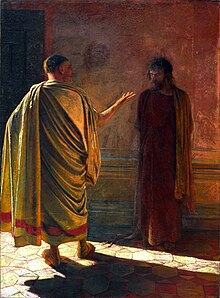Pontius Pilate
fifth Prefect of the Roman province of Judaea, from AD 26–36
Pontius Pilate was the fifth prefect of the Roman province of Judaea from AD 26–36. He served under Emperor Tiberius, and is best known from the biblical account of the trial and crucifixion of Jesus.

| This article about a political figure is a stub. You can help out with Wikiquote by expanding it! |
Quotes
edit- Jesus answered, “You say that I am a king. In fact, the reason I was born and came into the world is to testify to the truth. Everyone on the side of truth listens to me.”
- Then came Jesus forth, wearing the crown of thorns, and the purple robe. And Pilate saith unto them, Behold the man!
- John 19:5 [KJV]
Quotes about Pilate
edit- "WHAT is truth?" said jesting Pilate, and would not stay for an answer. Pilate was in advance of his time. For "truth" itself is an abstract noun, a camel, that is, of a logical construction, which cannot get past the eye even of a grammarian. We approach it cap and categories in hand: we ask ourselves whether Truth is a substance (the Truth, the Body of Knowledge), or a quality (something like the colour red, inhering in truths), or a relation ("correspondence"). But philosophers should take something more nearly their own size to strain at. What needs discussing rather is the use, or certain uses, of the word "true." In vino, possibly, "veritas," but in a sober symposium "verum."
- J. L. Austin, "Truth", Proceedings of the Aristotelian Society (1950), quoting Francis Bacon, Essays (On Truth) (1625)
- Do I still need to say that in the whole of the New Testament there is only one honourable figure? Pilate, the Roman governor. To take Jewish affairs seriously — he could not convince himself to do this. One Jew more or less — what does it matter? ... The noble scorn of a Roman when faced with an unashamed mangling of the word 'truth' gave the New Testament its only statement of any value, — its critique, even its annihilation: 'What is truth!' ...
- Friedrich Nietzsche, The Anti-Christ (1888), 46.
- Where else, then, can we get it? "Nowhere," Pilate answers in his talk with Jesus. "What is truth?" he asks, expressing in these three words his own and his contemporaries’ despair of truth, expressing also the despair of truth in millions of our contemporaries, in schools and studios, in business and professions. In all of us, open or hidden, admitted or repressed, the despair of truth is a permanent threat. We are children of our period as Pilate was. Both are periods of disintegration, of a world-wide loss of values and meanings. Nobody can separate himself completely from this reality, and nobody should even try. Let me do something unusual from a Christian standpoint, namely, to express praise of Pilate—not the unjust judge, but the cynic and sceptic; and of all those amongst us in whom Pilate’s question is alive. For in the depth of every serious doubt and every despair of truth, the passion for truth is still at work. Don’t give in too quickly to those who want to alleviate your anxiety about truth. Don’t be seduced into a truth which is not really your truth, even if the seducer is your church, or your party, or your parental tradition. Go with Pilate, if you cannot go with Jesus; but go in seriousness with him!
- Paul Tillich, The New Being (1955), Ch. 8: "What Is Truth?"
External links
edit- Encyclopedic article on Pontius Pilate on Wikipedia
- Media related to Pontius Pilate on Wikimedia Commons
- Works related to Author:Pontius Pilate on Wikisource